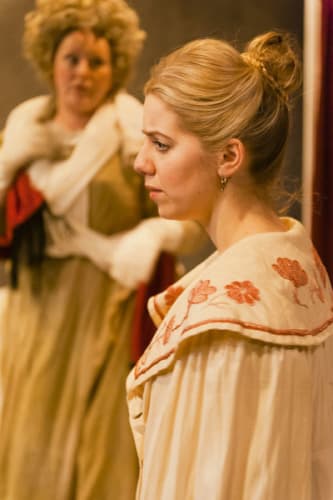This stage adaptation of Jane Austen’s romantic first novel is a delight. It is a very compact version that concentrates on only a handful of the book’s many characters.
Austen’s original title for the book was Elinor and Marianne and, of course, they are at its heart. The sisters are beautifully contrasted in the performances of Emma Fenny and Bobbi O’Callaghan, but their mother and younger sister are nowhere present and many others of their relations and acquaintance are omitted or passingly referred to only as when essential to the plot. Fanatical Austen devotees will miss them but such telescoping not only makes it possible, with some clever doubling, to stage this with a minimal cast of six but also helps deliver the story as a concentrated piece of theatre that nonetheless entirely captures the essence of Austen.
Elinor has a talent for drawing and picture frames become a feature of this production. It opens with a framed grouping of the cast and picture frames are also used to momentarily highlight particular moments as well as stand in for doorways and mirrors or are hung on walls to provide the final touch to creating an interior scene. The picture frame seems also a metaphor for Elinor’s orderly control, her drawings, you imagine, are carefully observed, neat and carefully finished. Seventeen-year-old sister Marianne is far too exuberant and emotional to be so easily contained.
The stylisation of the production embraces a theatrical physicality. When Marianne takes a rumble running downhill and the dashing Mr Willoughby comes to her rescue we see her fall, caught in Willoughby’s arms and carried off to safety and there are other dance-like interpretations of emotional situations that link scenes as well as an imaginative suggestion of a ball.
Forget the sweeping landscapes, the stately rooms and glittering chandeliers of film and stage Austen adaptations. Ellan Parry’s design uses travelling trunks and dust sheet covered furniture suggest the Dashwood home and their move to a West Country cottage and they become the hills and hedges of landscape. Simple screens and ruby curtains create London drawing rooms and salons, all elegantly set against textured grey walls and drapes on a floor of realistically simulated stone paving, while some visual effects are inspired by the contemporary fashion of silhouette portraits.
Director Helen Tennison makes one scene melt into another, performance continuing as the cast make the changes and the theatricality of the foregrounds the acting. She has drawn performances from this cast that can deliver the polite proprieties of Austen style dialogue with total naturalness. They are handsomely and romantically dressed to evoke the period correctly, with its skin fitting trousers, flowing frocks and Lainey Shaw, excitedly effusive as the girls’ Aunt Jennings, looking like a cross between caricatures of Sarah Siddons and a blowsy Lady Hamilton. Original music by Benedict Davies and a sound design by Matt Eaton that includes plentiful birdsong, together with Nicholas Holdridge’s subtly complex lighting all help sustain atmosphere and concentration.
James Burton plays both the unassuming Edward Ferrars, who forms an attachment to a blushing Elinor, who finds him “everything that is amiable” and Colonel Brandon, the older neighbour whom “everyone speaks well of but no-one cares about” though Aunt Jennings sees as a potential match for Marianne who clearly captivates him. Costume and characterisation make them very different; it is a doubling of which one is easily unaware.
Mr Willoughby, who can dance through the night from eight until four (“exactly what a young man ought to do” as Aunt Jennings says) is played with appropriate vigour by Jason Eddy. How could Marianne not fall in love with him with his charm and romantic good looks? When Willoughby is off stage hat and smock or a powdered wig and appropriate livery turn him into a servant or flunkey, for this is a hard-working ensemble. Francesca Wilding, who gives Lucy Steele, the conniving young woman who wrecks Marianne’s happiness and appropriate sharpness is also kept busy as an all-purpose maid but it is typical of this production that even the servants become real personalities.
Like Austen’s writing, this production is acerbic, funny, romantic and touchingly true in its picture of lives constrained by its society’s mores. It will surely please those who love Austen but it is a piece of storytelling that will also charm and delight any who still don’t know her work for it goes straight to the heart while still keeping a clear head. In the coming months the production will tour but there are still gaps in its schedule. If there are theatres with similar gaps in their programmes this could be just what you need.
After its run at the Rosemary Branch Theatre “Sense and Sensibility” will tour: 23 - 25 February and 1 - 3 March Yvonne Arnaud Theatre, Guildford; 11 March Norden Farm Arts Centre, Maidenhead; 16 March The Firestation Centre for Arts and Culture, Windsor; 21 March Olde Towne Hall Theatre, Hemel Hempstead; 23 March Vera Fletcher Hall, Thames Ditton; 29 - 30 March The Royal Inn on the Park, London E9; 10-14 April Ashcroft Theatre, Croydon; 17 April Theatre Severn, Shrewsbury; 18 - 20 April Chelmsford Civic Theatre; 22 April Hawth, Crawley; 26 - 28 April Devonshire Park, Eastbourne; 9 May Trinity Theatre, Tunbridge Wells; and 10 - 12 May Winchester Theatre Royal.
